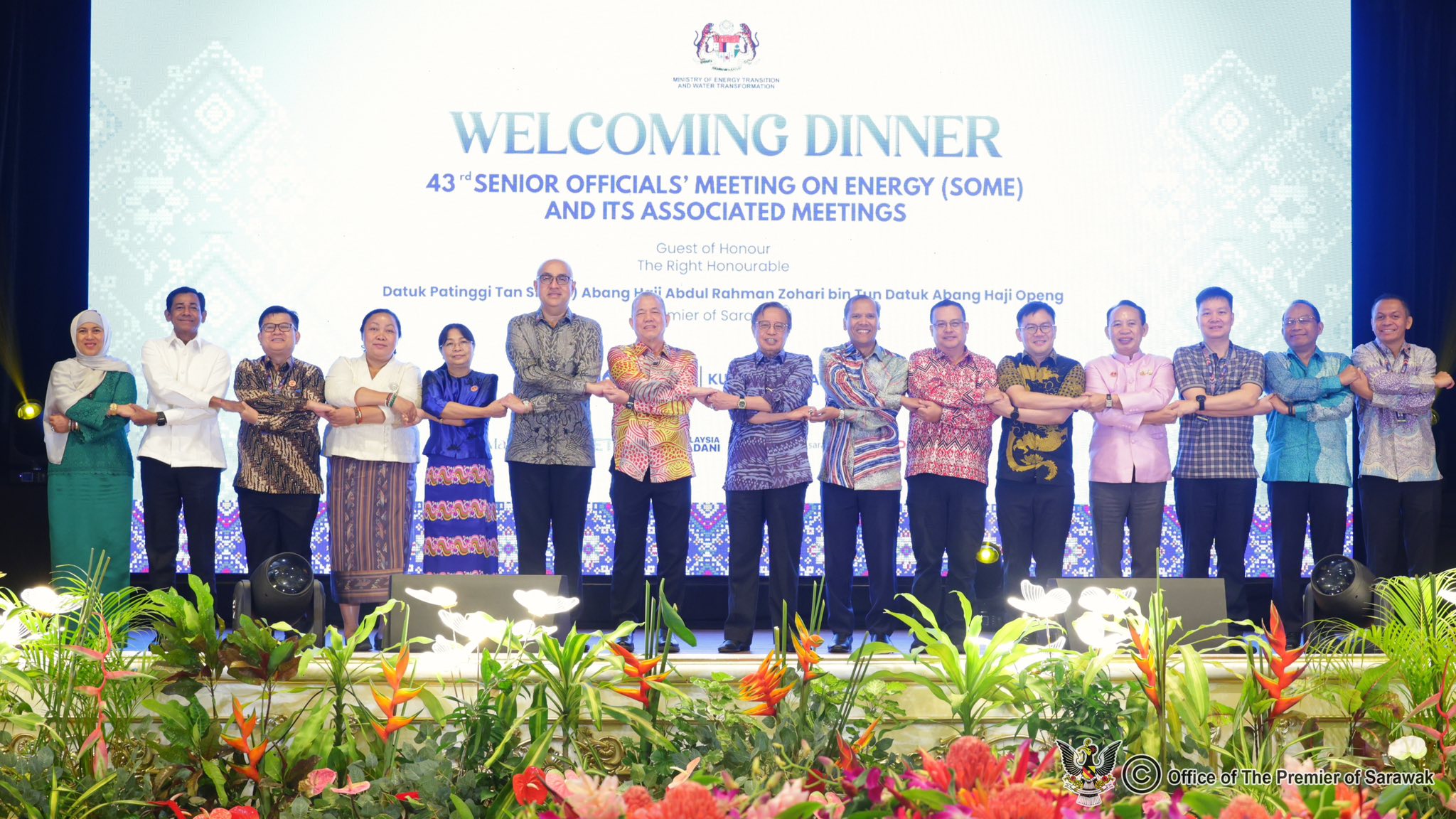JUN 2025
Sarawak Charts Ambitious Renewable Energy Future At 43rd Asean Energy Officials’ Meeting

KUCHING, June 16 — Sarawak is poised to play a key role in ASEAN’s energy future with bold commitments to renewable energy expansion, regional cooperation, and green innovation.
Premier of Sarawak Datuk Patinggi Tan Sri (Dr) Abang Haji Abdul Rahman Zohari Tun Datuk Abang Haji Openg said during a welcoming dinner for the 43rd ASEAN Senior Officials’ Meeting on Energy (SOME) and its associated meetings at Riverside Majestic Hotel, Kuching.
In his keynote speech, the Premier outlined Sarawak’s current energy landscape and its strategic push toward low-carbon energy solutions.
“We are fortunate to have the resources to produce hydropower. Currently, Sarawak has an installed capacity of 7 gigawatts, 65% of which comes from hydropower. By 2030, our target is to increase capacity to 10 gigawatts while maintaining a 60–70% renewable energy ratio,” he said.
To meet this target, the state is already developing major power projects. These include a 1.5-gigawatt gas turbine system with 1,000 megawatts in Bintulu and 500 megawatts in Miri and the 1.2-gigawatt Baleh hydroelectric dam. The Premier expressed confidence that Sarawak will be able to add 3 gigawatts to its grid within the next four years.
Emphasising climate change and the need to move beyond hydrocarbons, Abang Johari revealed Sarawak’s commitment to developing hydrogen as a clean energy source. “With five dams and ample water resources, we are investing in electrolysis technology to produce hydrogen. Although it is costly now, we believe advancements especially in membrane technology will make hydrogen a viable alternative,” he said.
He also highlighted Sarawak’s collaboration with international partners such as Japan, Korea, Gentari (Petronas), and Siemens to develop hydrogen technology. “God willing, by next year, we will have our first public transport system the ART powered by hydrogen,” he added.
Sarawak has long exported electricity to West Kalimantan, Indonesia, for over six years. This cooperation has recently expanded, with Sarawak Energy acquiring a 25% equity stake in East Kalimantan’s Mantram Indohydro Power.
“This is a clear example of ASEAN cooperation already at work,” said the Premier.
Looking ahead, Sarawak plans to export 100 megawatts to Sabah by early 2026, once the Sarawak and Sabah power grids are linked. The federal government is also studying the potential to extend this grid further to southern Philippines.
To further diversify its energy strategy, Sarawak is formulating a comprehensive Sarawak Gas Roadmap, led by its state-owned energy company Petros. This roadmap aims to harness the state’s abundant gas reserves and support the development of synthetic gas through carbon capture, utilisation and storage (CCUS) technologies.
“Sarawak is already exporting 5,000 tonnes of methanol daily to China. Our next step is converting methanol into ammonia another cleaner fuel which could be used across multiple industries, including shipping,” Abang Johari noted.
The Premier concluded by stressing Sarawak’s readiness to contribute to ASEAN’s integrated power grid and its shared clean energy goals. “With the technology available, we are confident Sarawak can contribute in our own small way to ASEAN’s energy transition,” he said.
Also present at the event were Deputy Prime Minister and Minister of Energy Transition and Water Transformation, Dato Sri Haji Fadillah Haji Yusof, Secretary General, Ministry of Energy Transition and Water Transformation, Dato’ Haji Mad Zaidi bin Mohd Karli, Permanent Secretary, Ministry of Energy and Environmental Sustainability Sarawak, Datu Abang Ahmad bin Abg Morni and Deputy Secretary General of ASEAN Secretariat (ASEC), Excellency Mr. Satvinder Singh.